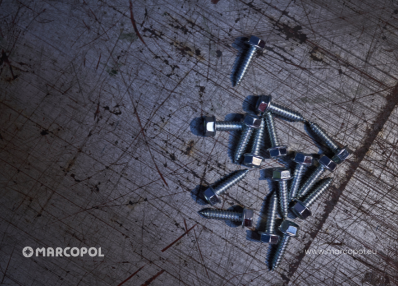
Tackling challenges and seizing opportunities. Poland’s Fastener Industry at the Forefront of Quality, Sustainability, and Innovation
With the dynamic development of technology and evolving market requirements, the industrial sector, especially the fastener segment, faces several challenges. Poland, as a key player in the European fastener production market, is particularly well positioned to meet these challenges.
Increased quality and normative requirements
The first and foremost challenge is the continuous adaptation to rising quality standards and regulations. Safety, strength, and durability standards are extremely important in the fastener industry, where precision and reliability are key. In this context, the growing importance of quality certificates, such as ISO and IATF, which confirm product compliance with international standards, is noteworthy.
Carbon tariff issues for fastener manufacturers
The fastener industry faces serious challenges regarding the implementation of the Carbon Border Adjustment Mechanism (CBAM) – a system introduced on October 1, 2023, to counteract carbon leakage where EU production in the most emission-intensive sectors is limited in favor of imports from third countries with lower environmental standards. CBAM aims to level the playing field for European producers, protecting them from competition with imported goods with a larger carbon footprint.
During the transition period until the end of 2025, importers must report greenhouse gas emissions without making payments. The challenges for entrepreneurs primarily involve collecting appropriate data, fulfilling reporting obligations, and adjusting internal procedures. Adapting to the requirements for purchasing CBAM certificates from 2026 is also crucial. The introduction of CBAM may impact changes in managing relationships with non-EU suppliers and potential costs associated with new formalities. Understanding and preparing for the new system is key to ensuring competitiveness in the EU market and meeting climate protection expectations.
The situation in the polish furniture industry in 2023 and its impact on the fastener sector
In 2023, the Polish furniture industry encountered numerous difficulties, signaled by recent mass layoffs in companies that had not previously indicated problems with the sale of their products. Although the decisions might be visible in the media landscape, the problem also affects many smaller firms facing similar challenges, often overshadowed by larger entities. A key factor in the current situation is the rapid rise in wood prices, significantly burdening manufacturers.
Economic data from the first half of 2023 and indicators for August show a decline in sales dynamics in the industry by over 10% compared to the previous year. In terms of impact on the economy, it is worth noting that the furniture industry accounts for over 2% of Poland’s GDP, becoming one of the country’s main employment sectors.
Difficulties in the furniture sector extend further. Industry debt has increased, and the number of new debtors has significantly risen. 2023 data from the Central Statistical Office indicated declines in retail furniture sales and a 3-5% drop in the industry’s nominal production value within a year. There are also deeper, structural problems that have affected the competitiveness of the Polish furniture industry. Rising raw material costs, higher-than-average electricity prices, and increased wages have significantly impacted the industry’s competitive ability. Additionally, high prices for wood from State Forests, one of the main raw material suppliers, pose a significant cost burden.
How can one combat lower demand? The offer of services such as consignment warehouses and other innovative solutions that enable cost savings can certainly constitute a competitive advantage for fastener manufacturers who have access to these options. Thanks to them, clients can not only reduce production costs, but also increase flexibility and efficiency in deliveries, which is particularly important in a dynamically changing market.
Sustainable development and ecology
Another challenge gaining importance is environmental care. Manufacturers are obligated to use eco-friendly technologies, minimizing carbon footprint and resource consumption. In this context, more and more companies are deciding to implement environmental management systems, such as ISO 14001.
The Era of Industry 4.0 brings with it the digitalization and automation of production processes. The introduction of modern technologies, such as robotics and artificial intelligence, becomes key to increasing efficiency and competitiveness. In this context, the growing importance of the Internet of Things (IoT) in monitoring and optimizing production processes is noteworthy.
Poland – A strategic fastener supplier in Europe
Thanks to its central location in Europe, Poland plays and will continue to play a key role in supplying fasteners to European markets in 2024.
- Convenient geographical location – the location of our country makes it a natural hub for the transportation of goods throughout Europe. Thanks to well-developed road and rail infrastructure, products quickly and efficiently reach recipients in various corners of the continent.
- High quality standards – polish enterprises are known for the high quality of produced fasteners. Regular investments in modern technologies and attention to employee training ensure products meet the highest standards.
- Attractive production costs – despite rising labor costs, Poland still offers competitive prices compared to other European countries. The combination of quality and attractive prices makes Poland an ideal place for investments in the fastener industry.
Polish Products – From Experts to Experts
The fastener industry faces many challenges in the coming years, but thanks to investments in technology, sustainable development, and high quality standards, Poland is well prepared to meet these challenges and maintain its position as a key supplier in Europe. Choose products from Poland – from experts to experts.
- Merry Christmas and a Happy New Year - 22 December 2025
- Façade screws. Which screws to choose for a building façade? - 19 December 2025
- Company christmas eve at the new hardening plant - 19 December 2025